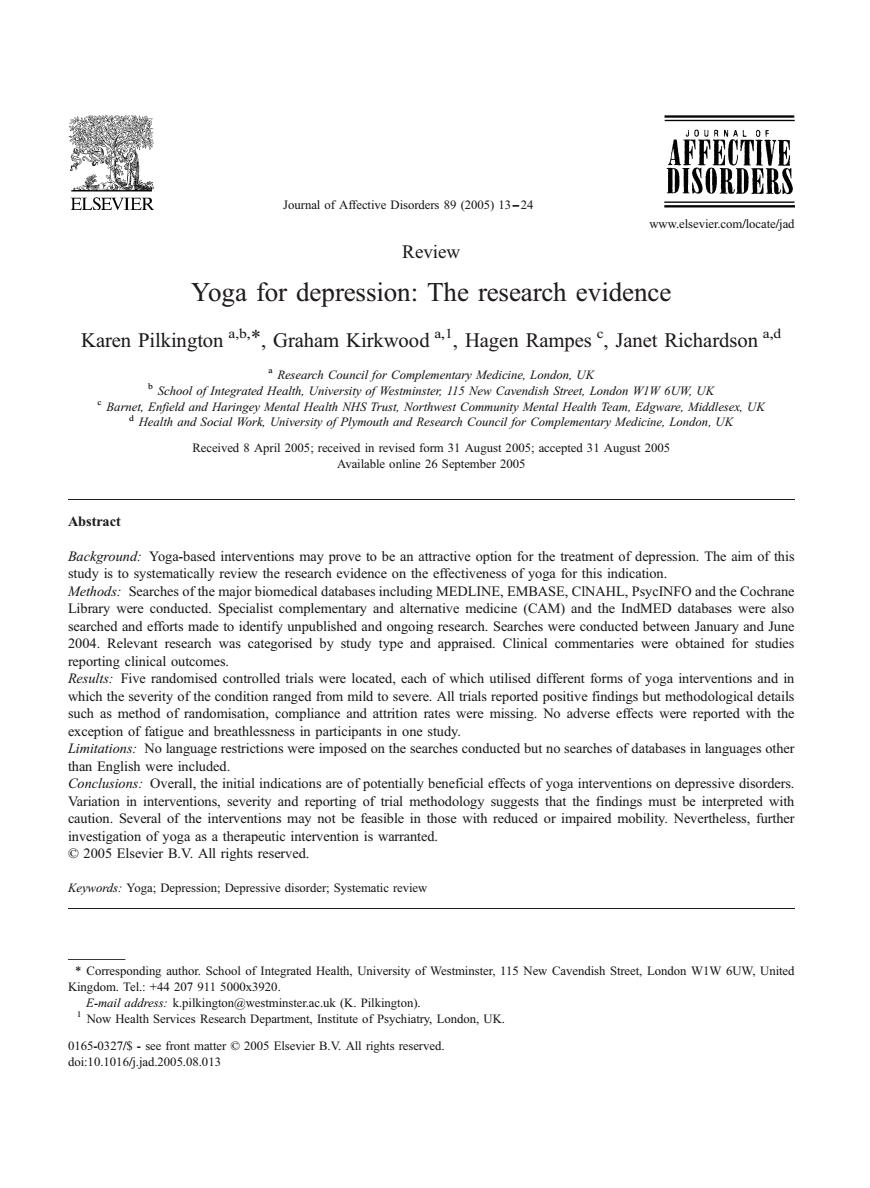正在加载图片...

OU R N AL O F DISORDERS ELSEVIER Journal of Affective Disorders 89 (2005)13-24 www.elsevier.com/locate/jad Review Yoga for depression:The research evidence Karen Pilkington*,Graham Kirkwood,Hagen Rampes,Janet Richardsond Research Council for Complementary Medicine,London.UK School of Integrated Health.University of Westminster.115 New Cavendish Street.London WIW 6UW.UK Barnet,Enfield and Haringey Mental Health NHS Trust Northwest Community Mental Health Team.Edgware.Middlesex.UK Health and Social Work.University of Plymouth and Research Council for Complementary Medicine,London.UK Received 8 April 2005;received in revised form 31 August 2005;accepted 31 August 2005 Available online 26 September 2005 Abstract Background:Yoga-based interventions may prove to be an attractive option for the treatment of depression.The aim of this study is to systematically review the research evidence on the effectiveness of yoga for this indication. Methods:Searches of the major biomedical databases including MEDLINE,EMBASE,CINAHL,PsycINFO and the Cochrane Library were conducted.Specialist complementary and alternative medicine (CAM)and the IndMED databases were also searched and efforts made to identify unpublished and ongoing research.Searches were conducted between January and June 2004.Relevant research was categorised by study type and appraised.Clinical commentaries were obtained for studies reporting clinical outcomes. Results:Five randomised controlled trials were located,each of which utilised different forms of yoga interventions and in which the severity of the condition ranged from mild to severe.All trials reported positive findings but methodological details such as method of randomisation,compliance and attrition rates were missing.No adverse effects were reported with the exception of fatigue and breathlessness in participants in one study. Limitations:No language restrictions were imposed on the searches conducted but no searches of databases in languages other than English were included. Conclusions:Overall,the initial indications are of potentially beneficial effects of yoga interventions on depressive disorders. Variation in interventions,severity and reporting of trial methodology suggests that the findings must be interpreted with caution.Several of the interventions may not be feasible in those with reduced or impaired mobility.Nevertheless,further investigation of yoga as a therapeutic intervention is warranted. 2005 Elsevier B.V.All rights reserved. Keywords:Yoga;Depression;Depressive disorder;Systematic review Corresponding author.School of Integrated Health,University of Westminster,115 New Cavendish Street,London WIW 6UW.United Kingdom.Tel.:+442079115000x3920. E-mail address:k.pilkington@westminster.ac.uk (K.Pilkington). Now Health Services Research Department,Institute of Psychiatry,London,UK. 0165-0327/S-see front matter 2005 Elsevier B.V.All rights reserved. doi:10.1016M.jad.2005.08.013Review Yoga for depression: The research evidence Karen Pilkington a,b, *, Graham Kirkwood a,1 , Hagen Rampes c , Janet Richardson a,d a Research Council for Complementary Medicine, London, UK b School of Integrated Health, University of Westminster, 115 New Cavendish Street, London W1W 6UW, UK c Barnet, Enfield and Haringey Mental Health NHS Trust, Northwest Community Mental Health Team, Edgware, Middlesex, UK d Health and Social Work, University of Plymouth and Research Council for Complementary Medicine, London, UK Received 8 April 2005; received in revised form 31 August 2005; accepted 31 August 2005 Available online 26 September 2005 Abstract Background: Yoga-based interventions may prove to be an attractive option for the treatment of depression. The aim of this study is to systematically review the research evidence on the effectiveness of yoga for this indication. Methods: Searches of the major biomedical databases including MEDLINE, EMBASE, ClNAHL, PsycINFO and the Cochrane Library were conducted. Specialist complementary and alternative medicine (CAM) and the IndMED databases were also searched and efforts made to identify unpublished and ongoing research. Searches were conducted between January and June 2004. Relevant research was categorised by study type and appraised. Clinical commentaries were obtained for studies reporting clinical outcomes. Results: Five randomised controlled trials were located, each of which utilised different forms of yoga interventions and in which the severity of the condition ranged from mild to severe. All trials reported positive findings but methodological details such as method of randomisation, compliance and attrition rates were missing. No adverse effects were reported with the exception of fatigue and breathlessness in participants in one study. Limitations: No language restrictions were imposed on the searches conducted but no searches of databases in languages other than English were included. Conclusions: Overall, the initial indications are of potentially beneficial effects of yoga interventions on depressive disorders. Variation in interventions, severity and reporting of trial methodology suggests that the findings must be interpreted with caution. Several of the interventions may not be feasible in those with reduced or impaired mobility. Nevertheless, further investigation of yoga as a therapeutic intervention is warranted. D 2005 Elsevier B.V. All rights reserved. Keywords: Yoga; Depression; Depressive disorder; Systematic review 0165-0327/$ - see front matter D 2005 Elsevier B.V. All rights reserved. doi:10.1016/j.jad.2005.08.013 * Corresponding author. School of Integrated Health, University of Westminster, 115 New Cavendish Street, London W1W 6UW, United Kingdom. Tel.: +44 207 911 5000x3920. E-mail address: k.pilkington@westminster.ac.uk (K. Pilkington). 1 Now Health Services Research Department, Institute of Psychiatry, London, UK. Journal of Affective Disorders 89 (2005) 13 – 24 www.elsevier.com/locate/jad